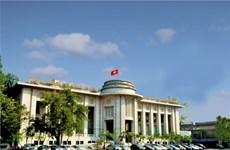France increases its market share in Vietnam
France hopes to double its share of the Vietnamese market by 2017,
French Trade Counselor and Ubifrance Chief Representative in Vietnam
Marc Cagnard spoke about the plan to promote trade between Vietnam and
France during his talk with Vietnam Economic News.
France hopes to double its share of the Vietnamese market by 2017,
French Trade Counselor and Ubifrance Chief Representative in Vietnam
Marc Cagnard spoke about the plan to promote trade between Vietnam and
France during his talk with Vietnam Economic News.
* What are Ubifrance’s major achievements in boosting trade between the two countries?
Bilateral trade between France and Vietnam has achieved great successes in recent years, reaching almost 2 billion USD in the first eight months of this year, including 1.27 billion USD worth of Vietnamese exports to France, a slight increase from a year ago.
The two countries celebrated 40 years of diplomatic relations this year. In that framework, Ubifrance developed around 20 major activities, aimed at helping about 350 French businesses to enter the Vietnamese market.
A France-Vietnam Business Forum organised in April by Ubifrance launched in Ho Chi Minh City, the economic part of the France Year in Vietnam. It attracted 130 French companies and 700 Vietnamese businesses through 1,100 direct meetings between businesses.
Only a few months after this Forum, about 25 percent of the French companies already reached or are about to reach trade agreements with their Vietnamese partners, focusing on transportation, information technology, sustainable development, health, cosmetics or beverage and spirits.
Also, during Prime Minister Nguyen Tan Dung's visit to France, Ubifrance and the Vietnam Trade Promotion Agency (Vietrade) concluded a cooperative agreement to further boost trade between the two countries.
* What do French businesses think about the Vietnamese investment and business environment?
Vietnam is a large and attractive market in the buoyant Association of Southeast Asian Nations (ASEAN) region. With a large and fast growing population, a dynamic economy and historical relations with France, Vietnam attracts French exporters and investors.
Vietnam is also expected to act as a bridge for foreign companies to enter other markets in the ASEAN region. Vietnam has become a member of the World Trade Organization (WTO) and is negotiating a Free Trade Agreement (FTA) with the European Union. All this is expected to make Vietnam more attractive to French investors.
However, French businesses consider that it is not always easy to access the Vietnamese market due to regular changes of regulations and high import tariffs on some items such as wine for example.
Moreover, in terms of investment and business environment, Vietnam is not the only attractive country in the ASEAN region. For this reason, Vietnam still has much to do including stabilising its legal regulations so as to attract foreign businesses furthermore.
More than 300 French businesses are operating in Vietnam and about 2,200 French companies annually export their products to Vietnam. Successful French companies operate (in Vietnam) in typically strong areas of interest for France, such as transportation, energy and environment, infrastructures, high technologies, health and cosmetics, food products and technologies.
* France currently has fairly high trade deficit with Vietnam. What will Ubifrance do in the near future to improve the situation?
As for France in general and Ubifrance in particular, Vietnam is a priority market. Ubifrance’s target for the short term is to further develop its activities and call many more French companies to Vietnam so as to double France’s share of the Vietnamese market by 2017 thus reducing France’s trade deficit with Vietnam.
We have drawn-up an ambitious action program for 2014 to make that goal happen. Apart from the organization of almost 15 trade missions under specific topics, Ubifrance will continue - with reinforced services - to help individual French businesses to enter the Vietnamese market.
From now to the end of this year, Ubifrance will launch in Hanoi and Ho Chi Minh City four trade missions to connect Vietnamese and French businesses. These events are expected to attract about 40 French companies in fields such as aviation MRO (maintenance, repair and overhaul), information technologies for the finance and banking sector, pharmaceuticals and cosmetics, and oil and gas-VNA
* What are Ubifrance’s major achievements in boosting trade between the two countries?
Bilateral trade between France and Vietnam has achieved great successes in recent years, reaching almost 2 billion USD in the first eight months of this year, including 1.27 billion USD worth of Vietnamese exports to France, a slight increase from a year ago.
The two countries celebrated 40 years of diplomatic relations this year. In that framework, Ubifrance developed around 20 major activities, aimed at helping about 350 French businesses to enter the Vietnamese market.
A France-Vietnam Business Forum organised in April by Ubifrance launched in Ho Chi Minh City, the economic part of the France Year in Vietnam. It attracted 130 French companies and 700 Vietnamese businesses through 1,100 direct meetings between businesses.
Only a few months after this Forum, about 25 percent of the French companies already reached or are about to reach trade agreements with their Vietnamese partners, focusing on transportation, information technology, sustainable development, health, cosmetics or beverage and spirits.
Also, during Prime Minister Nguyen Tan Dung's visit to France, Ubifrance and the Vietnam Trade Promotion Agency (Vietrade) concluded a cooperative agreement to further boost trade between the two countries.
* What do French businesses think about the Vietnamese investment and business environment?
Vietnam is a large and attractive market in the buoyant Association of Southeast Asian Nations (ASEAN) region. With a large and fast growing population, a dynamic economy and historical relations with France, Vietnam attracts French exporters and investors.
Vietnam is also expected to act as a bridge for foreign companies to enter other markets in the ASEAN region. Vietnam has become a member of the World Trade Organization (WTO) and is negotiating a Free Trade Agreement (FTA) with the European Union. All this is expected to make Vietnam more attractive to French investors.
However, French businesses consider that it is not always easy to access the Vietnamese market due to regular changes of regulations and high import tariffs on some items such as wine for example.
Moreover, in terms of investment and business environment, Vietnam is not the only attractive country in the ASEAN region. For this reason, Vietnam still has much to do including stabilising its legal regulations so as to attract foreign businesses furthermore.
More than 300 French businesses are operating in Vietnam and about 2,200 French companies annually export their products to Vietnam. Successful French companies operate (in Vietnam) in typically strong areas of interest for France, such as transportation, energy and environment, infrastructures, high technologies, health and cosmetics, food products and technologies.
* France currently has fairly high trade deficit with Vietnam. What will Ubifrance do in the near future to improve the situation?
As for France in general and Ubifrance in particular, Vietnam is a priority market. Ubifrance’s target for the short term is to further develop its activities and call many more French companies to Vietnam so as to double France’s share of the Vietnamese market by 2017 thus reducing France’s trade deficit with Vietnam.
We have drawn-up an ambitious action program for 2014 to make that goal happen. Apart from the organization of almost 15 trade missions under specific topics, Ubifrance will continue - with reinforced services - to help individual French businesses to enter the Vietnamese market.
From now to the end of this year, Ubifrance will launch in Hanoi and Ho Chi Minh City four trade missions to connect Vietnamese and French businesses. These events are expected to attract about 40 French companies in fields such as aviation MRO (maintenance, repair and overhaul), information technologies for the finance and banking sector, pharmaceuticals and cosmetics, and oil and gas-VNA













